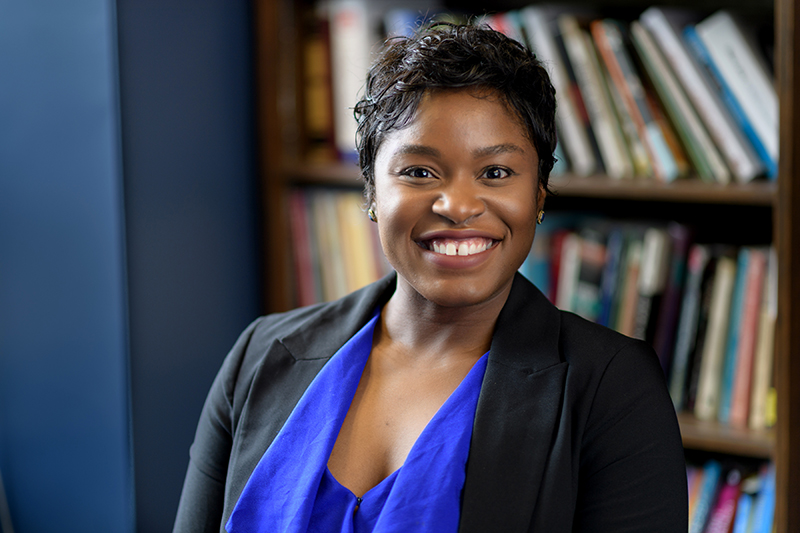In her own words: Holly Okonkwo
Anthropology professor studies experiences of women scientists and technologists in U.S. and Africa

Holly Okonkwo studies how race, gender, and place affect the experiences of women scientists and technologists of color. The applied anthropologist has worked with women in both the U.S. and Africa to gain a sense of their place within the science community.
Here, in her own words, the assistant professor of anthropology describes what she has observed:
WOMEN IN SCIENCE
My first project was in Georgia, in 2013 while I was working on my dissertation. I worked with a group of African-American women in computing – robotics, specifically. I really explored how they approach innovation, but also what it means to be a scientist, particularly for African-American women in the South.____________________
A lot of the women talked about how international research experience helped their identity formation and how they viewed what they did as purposeful. That’s how I got connected to looking at cultural variations of knowledge production and technology development.
____________________
NEW PROJECTS
I have new projects in Ghana and Nigeria. In Ghana, I’m working with secondary school girls in addition to women working in STEM. One school is in the capital, but the school is under-resourced and the other is an accelerated school for gifted young women from all over the continent. I’m working with the girls there to kind of design what would a science/innovation lab look like within this context? How can we draw on the lived experiences of the young women to co-create a meaningful place for them to innovate, design, produce new knowledge, or just come to sort of understand themselves and their agency in the world?____________________
My research focuses on the experiential knowledge and narratives of women in science within college and university settings. In Nigeria, I’m working with a faculty member at the University of Benin named Professor Dolly Ahbor. She is the former president of the national chapter of the Organization for Women in Science for the Developing World (OWSD). I’m exploring the ways women scientists and technologists, in this organization, navigate and negotiate global and local scientific networks, shifting sociocultural dynamics and their experiences in STEM development initiatives.
____________________
VALUE OF STEM KNOWLEDGE
Science and/or STEM knowledges are framed as a having capital, particularly for women who have been removed from resources, or access to resources, or educational opportunities in these spaces. Being a scientist or science person, they see it as positioning themselves differently within their local contexts.____________________
I think this is particularly unique because we usually think that students come to science to contribute to science or to the science communities. But they’re taking what they’re learning and using science as a tool to develop things that are important to them and their local contexts, or even to their family networks, or even just using the positionality of being educated to renegotiate their home environments.
____________________
They talk a bit about how the stereotypes and social expectations of what a science person is/does, and how that just does not map onto being an African-American woman, being a Black woman or being a woman. And so the women I worked with kind of continually reframe themselves in relation to these communities. But what I think is novel is that the women don’t necessarily feel like, "I don’t belong in this community," but more so, "What can I learn from this space for what it is that I want to do in life?"
____________________
LESSONS LEARNED
From what I did in Georgia, I think there are some real lessons for the way we tend to rely on ideas of identity in approaching training young people and/or students in STEM fields and their perceptions of science and technology. I think that we can learn different strategies and work toward a more democratized STEM.____________________
One of the things that’s really exciting about the context of Ghana is I’m seeing how they are melding together local practices of knowledge production and technology development and challenging notions of what it means to innovate. There is a lot of energy around creating opportunities for young people to be agents of change in addressing challenges such as food insecurity, natural resource management, and sustainable development initiatives.
____________________
I am working with an educational technologist, Michael Lachney, who specializes culturally situated design tools and technologies to strengthen school-community relationships. We are in the early stages of an exciting project drawing on STEM knowledge embedded in cosmetology practices and natural haircare movements.